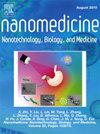Melanoma immunotherapy by nanosphere-vaccine elicited CD4+ and CD8+ T-cell response for tumor regression
IF 4.6
2区 医学
Q2 MEDICINE, RESEARCH & EXPERIMENTAL
Nanomedicine : nanotechnology, biology, and medicine
Pub Date : 2025-04-05
DOI:10.1016/j.nano.2025.102817
引用次数: 0
Abstract
Melanoma, driven by defective immune surveillance and cancer-cell evasion, has rising morbidity and mortality due to solar radiation exposure and delayed diagnosis. Effective tumor opsonization and phagocytosis are needed, demanding new therapeutic formulations. Here, we demonstrate the efficacy of a novel lipid-coated glucose nanosphere (LGNP) formulation decorated with ovalbumin (OVA) and containing pCMV-MART-1 (MT-1), termed the nLOM vaccine. This vaccine elicits specific immune responses through bone marrow DC maturation and CD4+/CD8+ T-cell activation, targeting melanoma antigens. In preclinical studies using orthotopic B16-F10 melanoma cells in C57BL/6J mice, the vaccine induced significant infiltration of T lymphocytes into tumor tissues, reducing tumor progression. Robust immune responses were observed in the spleens and inguinal lymph nodes of vaccinated mice, characterized by elevated cytokine levels. These findings suggest that the nLOM vaccine could elicit durable immunogenicity against melanoma through enhanced antigen presentation and holds promise for clinical development as an effective immunotherapy.

纳米球疫苗免疫治疗黑素瘤可诱导CD4+和CD8+ t细胞应答肿瘤消退。
黑色素瘤是由免疫监测缺陷和癌细胞逃避引起的,由于太阳辐射暴露和诊断延迟,发病率和死亡率不断上升。需要有效的肿瘤调理和吞噬作用,需要新的治疗配方。在这里,我们证明了一种新的脂质包被葡萄糖纳米球(LGNP)配方的有效性,该配方以卵清蛋白(OVA)修饰,含有pCMV-MART-1 (MT-1),称为nLOM疫苗。该疫苗通过骨髓DC成熟和CD4+/CD8+ t细胞活化引发特异性免疫反应,靶向黑色素瘤抗原。在使用C57BL/6J小鼠原位B16-F10黑色素瘤细胞的临床前研究中,疫苗诱导T淋巴细胞显著浸润到肿瘤组织中,减缓肿瘤进展。免疫小鼠的脾脏和腹股沟淋巴结出现了强烈的免疫应答,其特征是细胞因子水平升高。这些发现表明,nLOM疫苗可以通过增强抗原呈递来引发持久的抗黑色素瘤免疫原性,并有望作为一种有效的免疫疗法进行临床开发。
本文章由计算机程序翻译,如有差异,请以英文原文为准。
求助全文
约1分钟内获得全文
求助全文
来源期刊
CiteScore
11.10
自引率
0.00%
发文量
133
审稿时长
42 days
期刊介绍:
The mission of Nanomedicine: Nanotechnology, Biology, and Medicine (Nanomedicine: NBM) is to promote the emerging interdisciplinary field of nanomedicine.
Nanomedicine: NBM is an international, peer-reviewed journal presenting novel, significant, and interdisciplinary theoretical and experimental results related to nanoscience and nanotechnology in the life and health sciences. Content includes basic, translational, and clinical research addressing diagnosis, treatment, monitoring, prediction, and prevention of diseases.

 求助内容:
求助内容: 应助结果提醒方式:
应助结果提醒方式:


